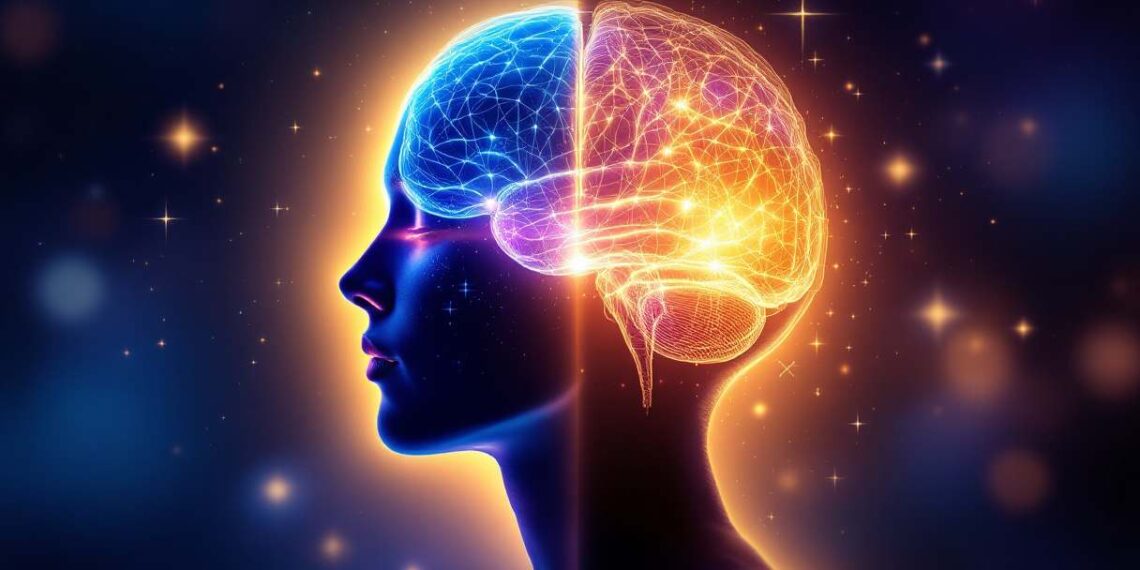Ever notice how a single night of poor sleep can turn your brain into a foggy maze where even simple tasks feel like solving a Rubik’s cube blindfolded? You’re not imagining it. The connection between sleep and cognitive function isn’t just about feeling tired – it’s about how your brain processes information, forms memories, and keeps you sharp.
Whether you’re a student cramming for exams, a professional juggling complex tasks, or someone who simply wants to maintain mental clarity, understanding the sleep-brain connection could be the key to unlocking your cognitive potential. Let’s dive into the fascinating world where sleep and brainpower intersect, and discover why those precious hours of rest might be your secret weapon for mental excellence.
Understanding the Link Between Sleep and Cognitive Health
Importance of Sleep for Cognitive Function
Who knew snoozing could be so crucial for keeping our brains in tip-top shape? When we’re catching those Zs, our brain’s going through some pretty important stuff—like tidying up memories, learning new tricks, and even helping us keep our emotions in check. But cut down on snooze time, and you might find yourself struggling with making decisions or focusing on your to-dos.
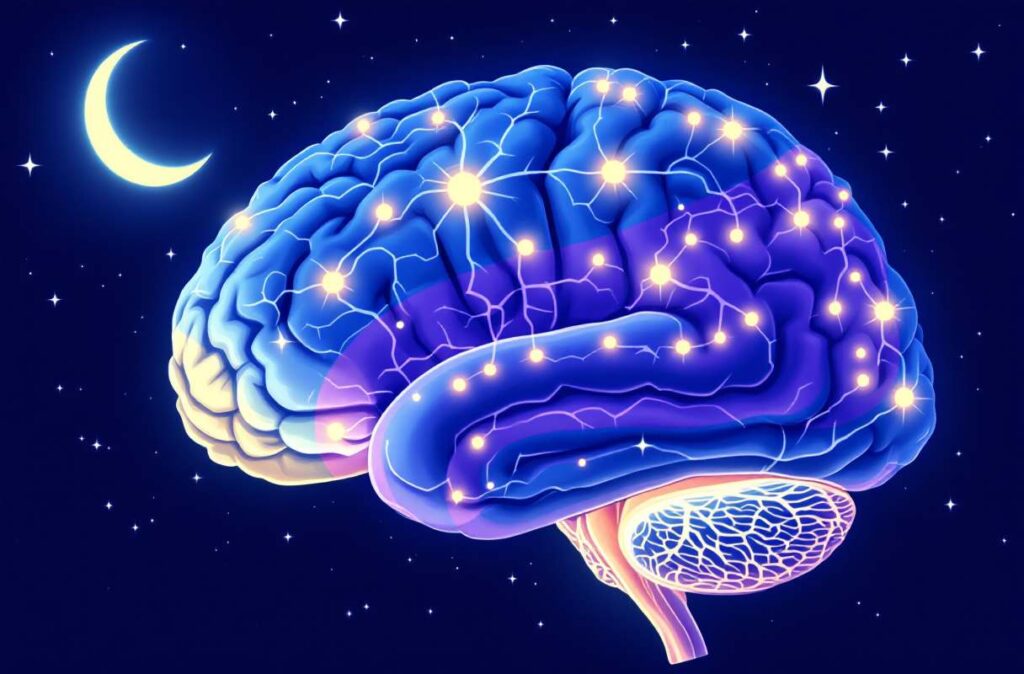
Experts have shown that a good night’s sleep can really juice up your problem-solving skills and get those creative juices flowing. Folks with a solid sleep routine tend to ace their day-to-day stuff and smoothly tackle whatever curveballs life throws their way. Here’s a little cheat sheet on how sleep affects our brains:
| Cognitive Function | Good Night’s Sleep Impact |
|---|---|
| Memory | Helps keep those learned nuggets locked in |
| Focus | Makes zoning in on tasks feel like a breeze |
| Creativity | Bolsters decision-making and dreaming up fresh ideas |
| Emotional Stability | Keeps stress and emotional hiccups at bay |
For all you parents out there, getting the lowdown on your kiddos’ sleep and their brain growth is key. Little ones’ nap routines, like newborn sleep patterns, are a major player in early brain development. And as they grow, especially during hiccups like toddler sleep regression or when those teens crash from teenage sleep deprivation, sleep becomes even more of a game-changer for their brainpower.
Different age groups might show signs of sleep woes in their own quirky ways, but everyone needs their forty winks no matter what. Young adults missing out on sleep might notice it hitting their school work or daily groove. And let’s not forget those in the prime of their lives, juggling pregnancy sleep shifts or perimenopause wake-ups, while our elderly pals might be dealing with issues like senior sleep apnea.
So what’s the takeaway? Make sleep a priority for keeping your brain sharp as a tack, no matter your age. Along with other life boosters like eating right and keeping active, solid sleep lays the groundwork for top-notch brain functions throughout your life. If you’re curious about nailing that perfect snooze, check out how to improve sleep naturally or snag some quick college student snooze hacks.
Sleep Needs Across Different Life Stages
How much shut-eye you need changes as you grow old, just like how you prefer chocolate over broccoli. Knowing these sleep patterns can make a world of difference in how sharp your brain stays.
“Quality sleep is not a luxury but a fundamental requirement for brain development and cognitive function at every age.” – Dr. Charles Czeisler
Newborns and Infants
Newborns and tiny tots are the sleep champions, needing loads of snooze time for that all-important brain work. They’re logged out for about 14 to 17 hours a day, broken into multiple nap sessions—because who can handle being adorable all day?
| Age Range | Recommended Sleep (Hours) |
|---|---|
| Newborns (0-3 months) | 14-17 |
| Infants (4-11 months) | 12-15 |
Want to know more about their wacky sleep antics? Check out newborn sleep patterns.
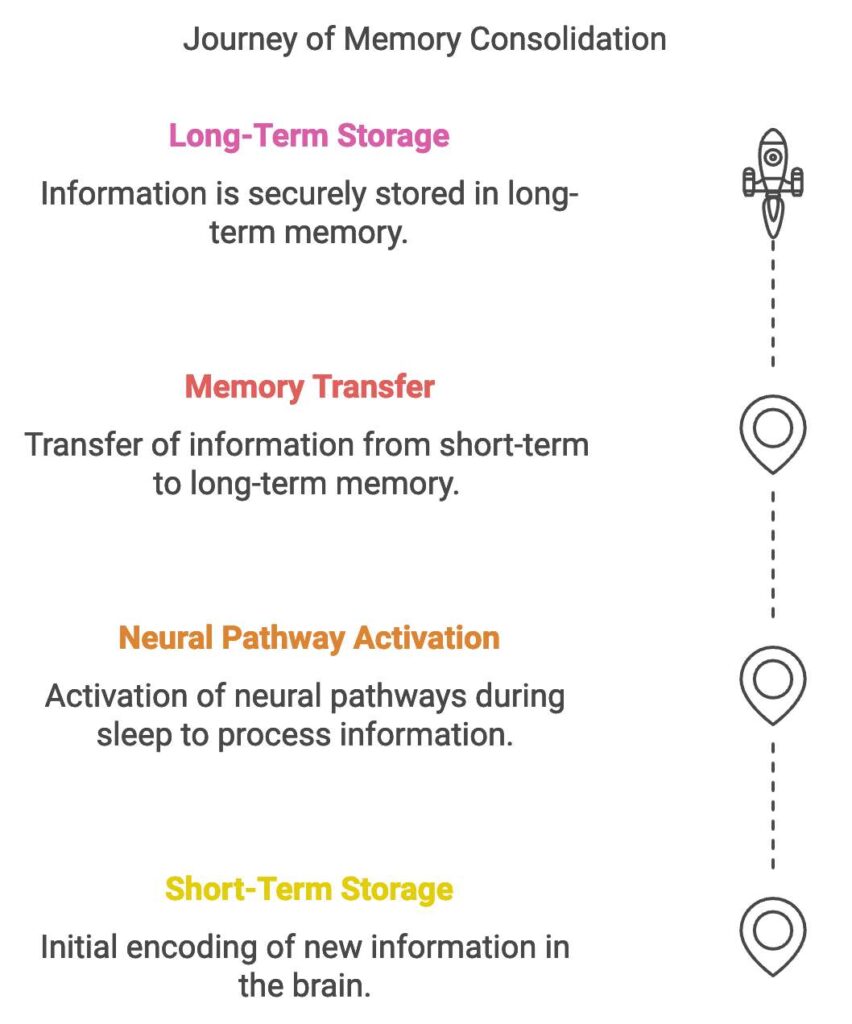
Toddlers and Preschoolers
Stepping into their rambunctious years, toddlers and preschoolers dial down their sleep a notch. They catch around 11 to 14 hours a day, naps included. A steady sleep routine can work wonders to keep their sleep on track when they suddenly start playing peekaboo at bedtime.
| Age Range | Recommended Sleep (Hours) |
|---|---|
| Toddlers (1-2 years) | 11-14 |
| Preschoolers (3-5 years) | 10-13 |
Need help handling their sleep surprises? Peek at our tips on toddler sleep regression and preschooler sleep habits.
Children and Adolescents
Little learners and teenagers still need a truckload of rest to keep up with their speedy growth spurts. School-aged adventurers should rack up 9 to 12 hours, while teens, you know, the ones you’ll never wake up for school, roll in around 8 to 10 hours. This endless dreamland is critical for keeping them sharp and sane.
| Age Range | Recommended Sleep (Hours) |
|---|---|
| School-Aged Children (6-13 years) | 9-12 |
| Teenagers (14-17 years) | 8-10 |
Want to tackle teenage sleep dilemmas? Head to teenage sleep deprivation.
Adults
Most of us grown-ups need between 7 to 9 hours of solid sleep. It’s the secret sauce for staying smart and calm, though juggling work, home, and life’s little curveballs can throw a wrench in the snooze routine.
| Age Range | Recommended Sleep (Hours) |
|---|---|
| Adults (18-64 years) | 7-9 |
| Older Adults (65+ years) | 7-8 |
Looking for more tricks to hit the sack? Check out our guides on sleep tips for 30s and hormonal sleep hiccups like perimenopause sleep issues.
Seniors
As the years roll on, sleep habits often change. Seniors generally need 7 to 8 hours of snooze time, though it might be more elusive due to sleep apnea or health quirks. But keeping up good sleep routines can really support that all-important cognitive health.
| Age Range | Recommended Sleep (Hours) |
|---|---|
| Seniors (65+ years) | 7-8 |
Check out the lowdown on senior sleeplessness with our guide to senior sleep apnea.
Grasping sleep needs through life underlines just how vital that snooze button is for keeping us ticking.
Impact of Sleep Deprivation on Cognitive Health
Missing out on sleep can really mess with the brain. Forgetting stuff, daydreaming too much, and just not thinking clearly are a few ways lack of rest messes with us. Knowing the problem is like having half a fix in the bag—better sleep can mean better brain power.
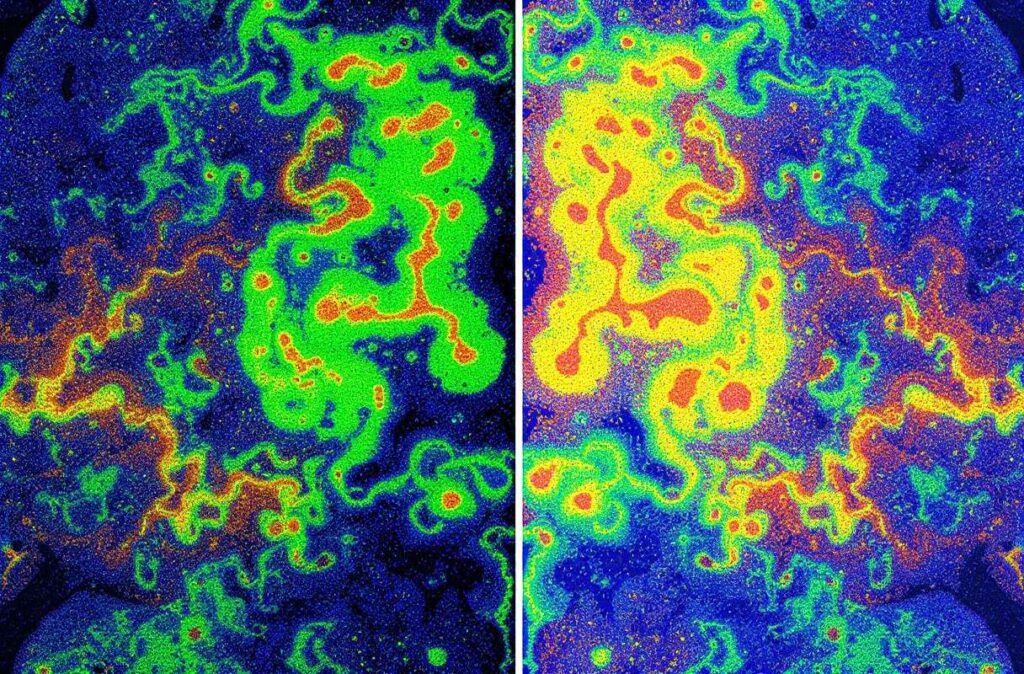
Messing with Memories
Skipping Zzz’s makes it tough to hold onto memories. While snoozing, your brain’s like a librarian sorting all the day’s info. Most of this sorting magic happens when your eyes start doing a dance called REM (Rapid Eye Movement). Dump the sleep, and your brain can’t file new memories properly, so don’t be surprised if you lose your keys—or entire conversations—from yesterday.
| Hours of Sleep | Memory Score (%) |
|---|---|
| 8 hours | 85% |
| 6 hours | 70% |
| 4 hours | 55% |
The numbers don’t lie. Shorter sleep equals leakier memory. Folks finding it hard to remember stuff should think about catching more rays on that pillow.
Trouble Paying Attention
Not enough sleep? Say hello to Mr. Distraction. Sleep-starved folks find keeping their eyeballs on a task about as easy as holding sand in a sieve. All it takes is one night tossing and turning to turn focus into fairy dust.
| Sleep Quality | Attention Test Score (%) |
|---|---|
| Good (7-8 hours) | 90% |
| Fair (5-6 hours) | 75% |
| Poor (less than 5 hours) | 60% |
The numbers paint it plain as day: worse sleep means a mind that wanders off. Got too much screen time? That’s not helping. Learn more from the article on screen time and sleep.
For moms, dads, and doctors keeping an eye on everyone, listen up: being serious about sleep can crank up anyone’s brain game no matter their age. Knowing why sleep’s super important—at every age—can get all of us snoozing smarter.
Tips for Improving Sleep Quality
Getting good sleep isn’t something nice-to-do, it’s a must-have for keeping your brain sharp and your mood sunny. Here are some easy-to-follow tips that’ll help you get that perfect nap haven, keep your sleep schedule in check, and master some chill-out tricks.
Crafting a Cozy Sleep Space
Your sleep space works wonders on how well you catch those Zs. Here’s what to keep in mind:
| Factor | Recommendations |
|---|---|
| Lighting | Use blackout curtains to keep things dark. Limit bright lights, especially from your gadgets. |
| Temperature | Keep it cool, around 60-67°F. Cooler temps help snooze time. |
| Noise Level | Use earplugs or a white noise machine to muffle random sounds. |
| Bedding | A comfy mattress and pillows make a difference. Pick bedding that you like—whether it’s hypoallergenic or just aired. |
Setting up a sleep sanctuary isn’t just about sleep; it’s your brain’s best friend. Want to know how screens mess with your sleep? Check our article on screen time and sleep.
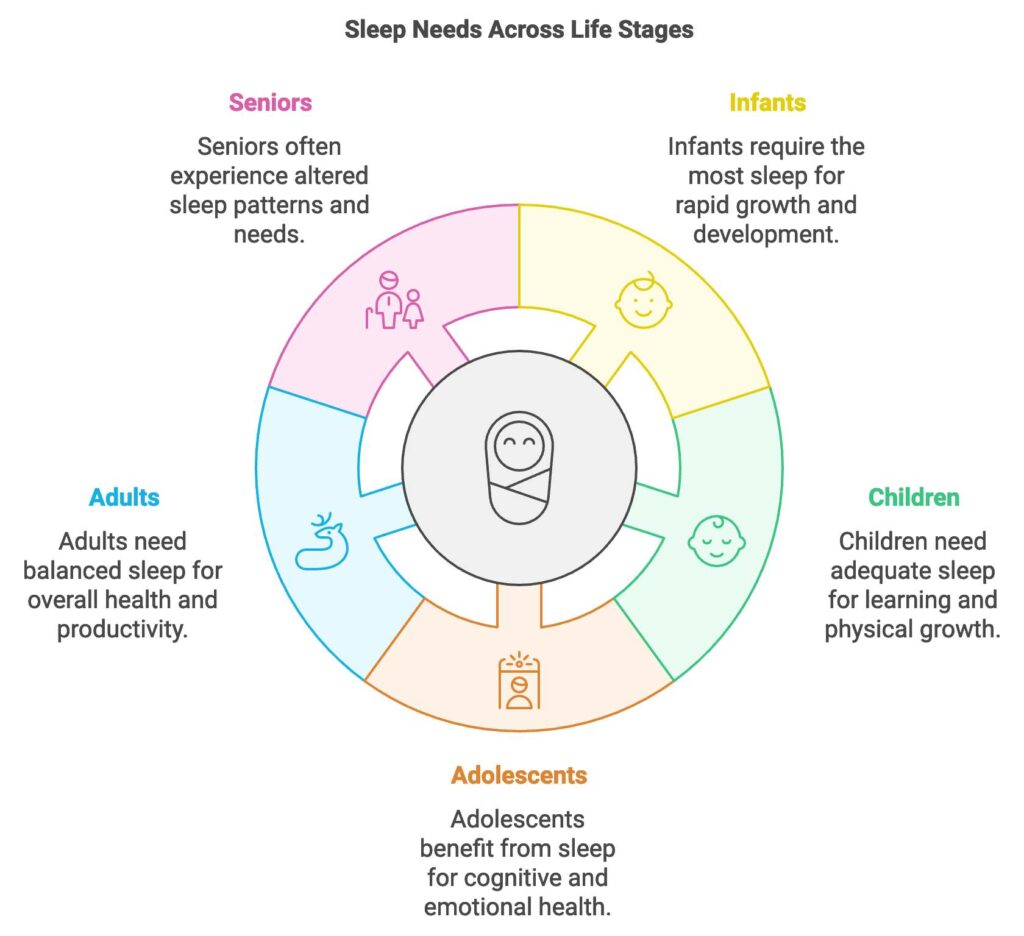
Nailing a Regular Sleep Schedule
Keeping a steady sleep and wake time helps your body know when to sleep and when to wake up. Here’s how to do it:
| Strategy | Details |
|---|---|
| Aim for Consistency | Get everyone in on the same sleep schedule, even on lazy Saturdays! |
| Bedtime Routine | Chill before bed with a book or a warm soak. It tells your body it’s time to wrap it up. |
| Sleep Duration | Sleep hours vary by age. See the table below. |
| Age Group | Recommended Sleep Duration |
|---|---|
| Newborns | 14-17 hours |
| Infants | 12-15 hours |
| Toddlers | 11-14 hours |
| Preschoolers | 10-13 hours |
| School-age Kids | 9-11 hours |
| Teens | 8-10 hours |
| Grown-ups | 7-9 hours |
| Seniors | 7-8 hours |
Got a cranky toddler or a zombified teen? Read up on toddler sleep regression or teenage sleep deprivation.
Mastering Sleepy-Time Calmness
Unwinding before bed can make your sleep magic. Try these:
- Deep Breathing: Breathe slow and deep to ease your mind and relax.
- Meditation: Mindfulness or guided meditation melts stress away.
- Gentle Stretching: Light stretches can shake off muscle tension and relax you.
For more bedtime tips and tricks, give our article on improve sleep naturally a look. Trying out these chill methods can majorly boost your sleep and keep your brain in top shape.
Sleep Disorders and Cognitive Health
Sleep Disorders that Affect Cognitive Functioning
Got trouble with your snooze time? You’re not alone. Messed-up sleep isn’t just a pain—it’s a brain drainer. Things like insomnia, sleep apnea, and restless legs syndrome stick their noses where they don’t belong, namely into your memory, attention, and decision party.
| Sleep Disorder | What’s Going On | What It Does to Your Noggin |
|---|---|---|
| Insomnia | Trouble getting or keeping those Z’s | Memory gets a bit wobbly, and focusing can feel like herding cats. |
| Sleep Apnea | Breathing stops and starts like a bad engine | Means you’re yawning all day with muddled memory and short attention. |
| Restless Legs Syndrome | Can’t stop, won’t stop—your legs, that is | Makes sleep hard to catch, so the brain takes a hit, too. |
| Narcolepsy | Unexpectedly kissing consciousness goodbye | Zaps attention and cognitive sharpness in waking hours. |
If any of these hit close to home, it might be time to chat with a doctor. They’ll help you figure out what’s up and how to fix it.
Seeking Professional Help
Got a hunch your sleep’s gone awry? Time to call in the experts. Pros can run the tests, quiz you on your pillow habits, and maybe even tuck you in for a sleep study to see what’s up.
Here’s the lowdown on some fixes they might suggest:
- CBT-I, which is like having a therapist for your sleep drama
- CPAP for those with apnea, tackling those nighttime breath-holds
- Meds for restless legs or narcolepsy; sometimes, you gotta fight fire with fire
Grasping how sleep and your brain buddy up can set you on the right track to dreamland. And hey, if you’ve got teens running on fumes, peep teenage sleep deprivation. New parents losing sleep? We’ve got postpartum sleep tips for you. Tackling sleep issues head-on is your GPS to better thinking and healthy living all around.
Lifestyle Factors Affecting Sleep and Cognitive Health
Knowing the impact of daily habits on your sleep is key to keeping your brain sharp. Two biggies here are what you eat and how you move.
Diet and Its Connection to Sleep
What you put on your plate can make or break a good night’s sleep. Some foods tuck you into dreamland, while others keep you wide awake. Eating a well-rounded diet with stuff like magnesium, calcium, and omega-3s can help your brain switch gears to sleep mode.
Here’s a quick chart showing foods that help you snooze:
| Food Group | Examples | Sleep Boosting Nutrients |
|---|---|---|
| Dairy | Milk, yogurt | Calcium, tryptophan |
| Nuts | Almonds, walnuts | Magnesium, melatonin |
| Grains | Oats, barley | Complex carbs, serotonin |
| Fruits | Bananas, cherries | Potassium, anthocyanins |
| Lean Proteins | Fish, turkey | Protein, omega-3 fats |
On the flip side, chow down on too much caffeine or sugar, and you’ll be tossing and turning. Parents need to keep an eye on not just what the kiddos eat, but also their screen habits, which could lead to late-night munching.
Physical Activity and Its Role in Cognitive Health
Breaking a sweat does wonders for your sleep and brainpower. Regular exercise sets your internal clock, helping you drift off and stay asleep. Plus, those feel-good endorphins that you get from working out are like a natural chill pill.
Here’s what activity looks like at different ages:
| Life Stage | How Much Movement? |
|---|---|
| Newborns and Infants | Play and gentle wiggles |
| Toddlers and Preschoolers | 3 hours of fun play each day |
| Kids and Teens | 1 hour of moderate to vigorous play daily |
| Adults | 150 minutes a week, basic stuff like walking |
| Seniors | Same as adults plus some muscle work twice a week |
But don’t hit the gym right before bedtime; it’ll keep you too wired to rest. Keeping a steady routine of activity will add up with time, making sleep and brain health better buddies.
By chowing down on good eats and keeping moving, you can catch better Z’s and help your brain stay sharp. Want more snoozy secrets through different stages of life? Check out our articles on newborn sleep patterns and pregnancy sleep changes to learn more.
Conclusion
Understanding the vital connection between sleep and cognitive health isn’t just about getting enough rest – it’s about investing in your brain’s future. From memory consolidation to emotional regulation, from problem-solving to creativity, quality sleep touches every aspect of our mental capabilities. By recognizing sleep’s crucial role across different life stages and implementing strategies to improve sleep quality, we’re not just fighting fatigue; we’re enhancing our cognitive potential. Remember, good sleep isn’t a luxury – it’s a fundamental pillar of brain health that deserves our attention and respect. Whether you’re optimizing your own sleep habits or supporting others in their journey to better rest, the investment in quality sleep today pays dividends in cognitive health tomorrow.
FAQs
How does poor sleep affect cognitive function?
Poor sleep impacts memory formation, attention span, decision-making abilities, and emotional regulation. Even one night of inadequate sleep can significantly reduce cognitive performance.
What’s the ideal amount of sleep for optimal brain function?
While needs vary by age, most adults require 7-9 hours of quality sleep. Consistency in sleep schedule is as important as quantity.
Can lost sleep be “made up” on weekends?
While extra weekend sleep can help, it doesn’t fully compensate for chronic sleep loss. Maintaining a consistent sleep schedule is more effective for cognitive health.
How long does it take for sleep deprivation to affect cognition?
Cognitive decline can begin after just one night of poor sleep, with effects becoming more severe with continued sleep deprivation.
What are the best practices for maintaining cognitive health through sleep?
Maintain a consistent sleep schedule, create a relaxing bedtime routine, optimize your sleep environment, and address sleep issues promptly with healthcare providers.
Resources:
- National Institute of Neurological Disorders and Stroke: “Brain Basics: Understanding Sleep”
https://www.ninds.nih.gov/health-information/public-education/brain-basics/brain-basics-understanding-sleep - Mayo Clinic: “Sleep and Brain Health”
https://www.mayoclinic.org/healthy-lifestyle/adult-health/in-depth/sleep-and-brain-health/art-20441103

